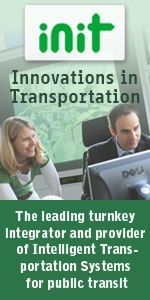

| In This Issue |
| » BREAKING NEWS |
| » NEWS HEADLINES |
| » AROUND THE INDUSTRY |
| » IN DEPTH |
| » COMMENTARY |
| » PEOPLE ON THE MOVE |

Consult the classifieds in this issue to find 3 notices, 11 bids and proposals, and 7 job opportunities!
| NEWS HEADLINES |
Deficit Commission Report: Raise Gas Tax for Trust Fund
A dedicated fuel tax increase—rising to 15 cents per gallon from 2013 to 2015—to fund the federal Transportation Trust Fund is among the recommendations of the National Commission on Fiscal Responsibility and Reform in The Moment of Truth, the report it released Dec. 1.
“In order to bring down the deficit, Washington will have to rein in discretionary spending,” the report states. “Every aspect of the discretionary budget must be scrutinized, no agency can be off limits, and no program that spends too much or achieves too little can be spared.”
The report describes the current “hybrid budget treatment” of the Transportation Trust Fund: contract authority is mandatory but outlays are discretionary. According to the report: “This hybrid treatment results in less accountability and discipline for transportation spending and allows for budget gimmicks to circumvent budget limits to increase spending.”
The plan reclassifies spending from the Transportation Trust Fund to make both contract authority and outlays mandatory, and then limits spending to actual revenues collected by the trust fund in the prior year once the gas tax is fully phased in. Shortfalls up until that point would be financed by the general fund.
In addition to the gradual 15-cent increase in the per-gallon gas tax, the report calls for Congress to “limit spending from trust funds to the level of dedicated revenues from the previous year. Before asking taxpayers to pay more for roads, rail, bridges, and infrastructure, we must ensure existing funds are not wasted.” Another recommendation in the report is that “Congress should limit trust fund spending to the most pressing infrastructure needs rather than forcing states to fund low-priority projects.”
The overall goal of the plan is to provide for nearly $4 trillion in deficit reduction through 2020 and reduce the deficit to 2.3 percent of Gross Domestic Product while also ensuring that the Social Security System remains solvent. This recommendation is found under Discretionary Spending Cuts, the first of the report’s six major components.
APTA President William Millar said in a statement: "APTA strongly supports the proposal to phase in a 15-cent federal motor fuels tax increase. Adequate investment in the nation's integrated transportation system at the state, local, and federal levels is the underpinning for the nation's future economic growth." He added that the proposed increase in the federal motor fuels tax "should have another immediate and tangible result by allowing the Congress to move forward with a long-term authorization of the surface transportation program that provides the resources and policy reforms necessary."
APTA and its coalition partners joined with Americans for Transportation Mobility (ATM) to strongly support the co-chairs of the national commission.
“The United States needs to transform some of the important economic infrastructure of our country—our roads, bridges, and public transportation systems—from a system designed for the 20th century to one that will support a 21st-century economy and the quality of life of its citizens,” ATM said, adding: “By increasing user fees and indexing them to inflation to maintain their purchasing power, as part of the broader set of recommendations in the commission’s report to address the deficit and debt, highway and transit programs would be on a sustainable path…”
The text of the report is available online.
| « Previous Article | Return to Top | Return to Main | Next Article » |
|
||||||
| AMERICAN PUBLIC TRANSPORTATION ASSOCIATION |
Telephone (202) 496-4800 • Fax (202) 496-4321
Search Back Issues
